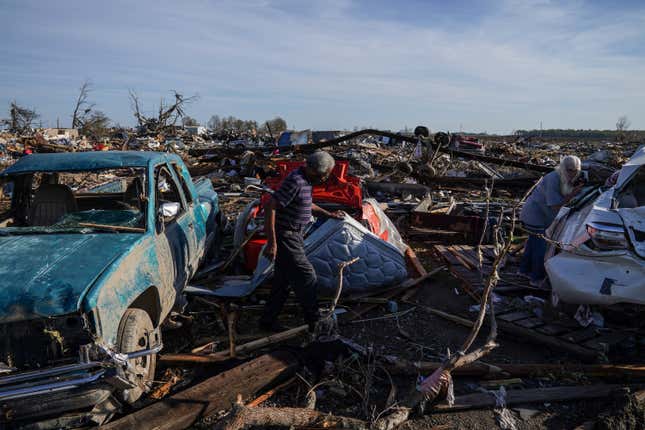
It’s hard to calculate the sheer devastation in Rolling Fork, Miss., after a deadly tornado ripped through the small rural community. According to reports, at least 26 people died in the storm that passed through Mississippi and Alabama on Friday. Roughly half of those deaths were in Rolling Fork, a predominantly Black town with less than 1,900 residents in the Mississippi delta. So what made the storm so devastating in Rolling Fork? Well, experts say that in this case, poverty and extreme weather created a deadly combination.
According to the United States Census Bureau, roughly 21 percent of residents in the town live in poverty. And experts told NBC News that the high percentage of mobile and manufactured homes put residents in extra peril.
Roughly 54 percent of all deaths in homes during a tornado occur in mobile or manufactured homes, according to the National Weather Service, even though these homes only make up 6 percent of the entire U.S. housing stock. They estimate that people are between 15-20 times more likely to be killed in a mobile or manufactured home than in a permanent home.
In short, this crisis was brewing long before a tornado swept through town. Angelia Eason, the county coroner, told NBC News that eight of the 13 people killed by the storm in Rolling Fork were in a mobile home.
For residents still reeling from this disaster, there is some hope. On Sunday, President Joe Biden issued an emergency declaration for Mississippi to ensure federal funding can go to the most devastated areas. Sharkey County, which encompasses Rolling Fork, was included in the emergency declaration. And Mississippi Governor Tate Reeves proclaimed that “help is on the way.”
Still, Reeves’s track record with disasters in Black communities, such as his handling of the Jackson water crisis, doesn’t exactly inspire confidence. And it doesn’t help that more severe weather is predicted to hit Mississippi and several other states this upcoming Sunday.
The crisis facing Rolling Fork as they seek to rebuild isn’t entirely new, especially not in Mississippi. Experts have raised the alarm time and time again that Black communities do not have the infrastructure to handle severe weather events that are becoming an increasing part of our reality, thanks to climate change.
Last year, The Root spoke with Sacoby Wilson, a Professor of Environmental Justice at The University of Maryland School of Public Health, about the impact of systemic disinvestment in Black communities.
“Folks of color, we’ve already been impacted by poor infrastructure and environmental hazards,” said Wilson. “We’re going to feel the effects of climate change, and we’re gonna feel it first.”
As residents begin to heal from the trauma and devastation that hit their small town, one can only hope that politicians take this opportunity to rebuild with the lessons of these tragedies in mind.

